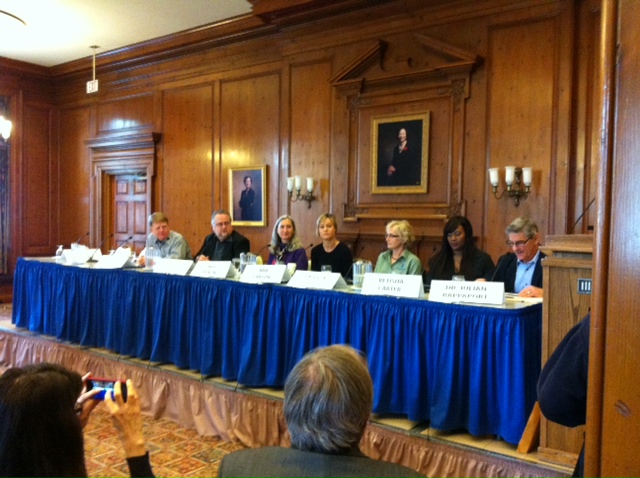The morning after the Opening Night presentation of Steve James’ “Life Itself,” in which Roger Ebert so eloquently defines great film as an “empathy machine,” we got to see the impact of that as a panel of critics, filmmakers, and experts discussed “Challenging Stigma Through the Arts,” the first of a series of panels at the 16th Annual Roger Ebert’s Overlooked Film Festival. Moderated by Dr. Julian Rappaport, the panel focused heavily on another film in this year’s program, Destin Cretton’s devastating “Short Term 12.” While much of the conversation centered on just how much Cretton “got right” in his account of mental illness in a youth home community, the panelists used the opportunity to discuss not just the fictional account of the screenplay but how society and our mental health industry deal with troubled youths. It was the perfect example of Roger’s belief that film can offer us windows into new characters and worlds that may not be our own but can teach us lessons about how other people live and thrive past adversity.
Panelists included “Short Term 12” star Brie Larson, writers Nell Minow & Steve Prokopy, documentary filmmaker Tim Watson, and mental health professionals Retisha Carter and Patricia Ege. Moderated by Dr. Rappaport, the discussion started with a deserved appreciation of “Short Term 12″ from Minow and Prokopy. The former pointed out how often cinema reduces mental trauma to one of three categories—”Deranged Lunatic” (a la “Hannibal“), “Cute & Cuddly” (mental illness isn’t an issue as much as an idiosyncrasy), and the “Elvis Hug Movie” (a reference to “Change of Habit,” in which Elvis hugged a mentally ill person and cured them). “Short Term 12” succeeds because it shatters these stereotypes. Prokopy later in the panel spoke about how it’s a film in which we’re constantly waiting for it to make a wrong step, to sink into stereotype or cliché as so many dramas like it have before, but it never does.
After the laudatory introduction to the film, Ms. Larson spoke captivatingly about her process and how she personalized the character of Grace with her own background, “understanding the darkness” in herself. At several times in the panel, she mentioned personal elements that she brought to the character, including learning that “weakness becomes a strength” and that we have to “find new ways to one love another”. The panel was primarily about the way healing is represented in “Short Term 12” and the mental health community of 2014 but it could have also been used as a lesson in how an actress uses personal issues to achieve a professional high.
The conversation then turned to the two people most attuned to the state of mental health, Dr. Carter and Dr. Ege, who are on the front lines every day. Dr. Carter spoke of the importance of peer-to-peer relationships and recognizing that the teens who need help are not that different from those giving it. The example-driven lesson of “I’ve done it, you can do it,” is as powerful as any therapy. It was a theme that the panel kept returning to as it’s so well-embodied in Cretton’s film—the idea of community and relating to those who may be just a few steps behind you on your journey out of the darkness. As Larson said, plants always fight for the light, just as people are willing to keep struggling to find happiness and strength.
It’s not always easy. Dr. Ege spoke of the difficulty in connecting with teens when their counselors are not allowed to hug them. But everything came back to community—relate to your subject, know that they’re not that different from you, heal through commonality more than stigma. And it’s the exact same thing that Roger defined as the true power of film, creating a community within the fictional world up on the screen that makes viewers better by having shared it.
The event ended with a question that couldn’t have been more perfectly encapsulating if it had been scripted. A young writer named Chike Coleman of Sound On Sight, who first thanked Dr. Carter for changing his life in a way not dissimilar to the way lives are changed in “Short Term 12,” asked about “empowering moments,” the little things that can seem insignificant to one person but mean the world to another. Of course his empowering moment came in the form of an email from Roger, which encouraged him to keep up his creative, professional passion. Again, as it so often does at “Ebertfest,” it felt like everything came full circle—love of film, life, and human connection.












